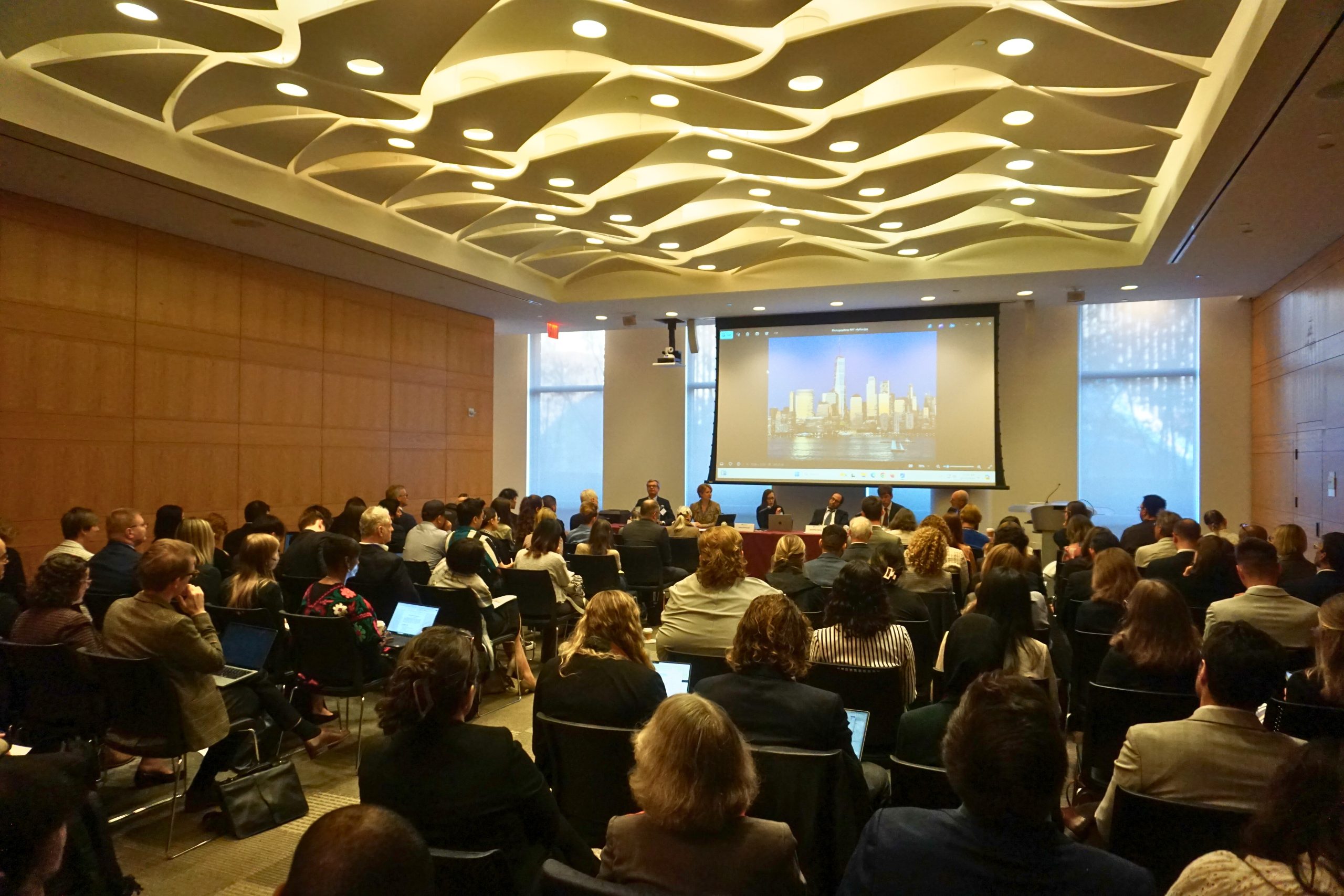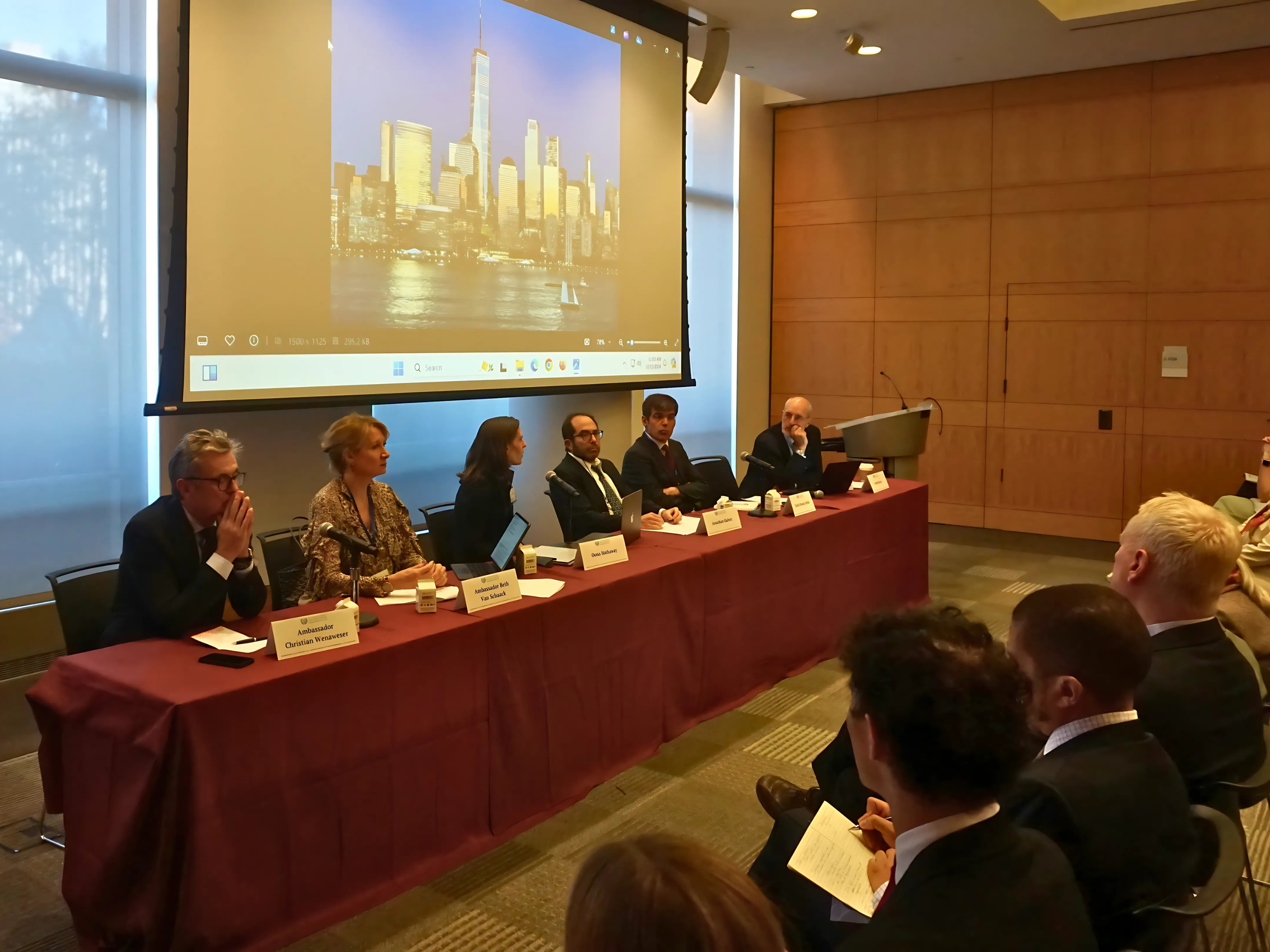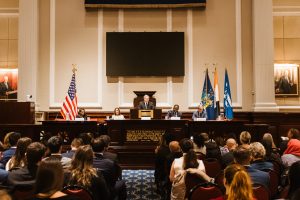ILW24 Panel Reflection – The War in Ukraine: Lessons Learned and Challenges Ahead for International Criminal Law
by Anne Harper, 2024 Student Ambassador and J.D. Candidate, Cardozo Law*
This blog is part of a series of reflections on ILW 2024 by our Student Ambassadors. Each Student Ambassador engaged with various panels and will share their experiences over the spring and in the lead up to ILW 2025.

At International Law Week 2024, conversations about the invasion of Ukraine continued. Gabor Rona moderated a panel entitled “The War in Ukraine: Lessons Learned and Challenges Ahead for International Criminal Law.” The panel was composed of David Donat Cattin, Oona Hathaway, Jonathan Hafetz, Ambassador Beth Van Schaack, the U.S. Ambassador-at-Large for Global Criminal Justice, and Ambassador Christian Wenaweser, the Permanent Representative of Liechtenstein to the UN. Predominant themes emerged from the discussion, including the ICC’s role and parties to the Rome Statute, evidence collection, and the responsibility of, and actions taken by, individual States, including Ukraine.
As expected, the crime of aggression and the gap in legal accountability mechanisms for those crimes were at the forefront of the panelists’ discussion. As to the crime itself, Cattin opened the conversation by identifying the crime as a jus cogens prohibition. Hathaway followed up by pointing out that the Nuremberg Court established crimes of aggression or “crimes against the peace” as “the most supreme international crime,” as it is “an accumulated evil of the whole.”
The International Criminal Court plays a prominent role in prosecuting international crimes. Since the Russian war on Ukraine began, there have been significant developments in prosecutions related to the conflict. However, many questions remain unanswered as to how to hold Russia accountable for the crime of aggression.
The ICC issued warrants for the arrest of Russian President Vladimir Putin and other Russian officials, but State Parties to the Rome Statute must be willing to comply with their obligations to effectuate those warrants. Ambassador Van Schaack mentioned Putin’s recent travel to Mongolia, a state party to the Rome Statute, and Mongolia’s failure to arrest Putin when he was within their territory. Mongolia argued that head-of-state immunity in bilateral relations protected Putin, but the ICC held that such immunity was secondary to Mongolia’s obligation to arrest. As such, Mongolia was not in compliance with the Rome Statute. Cattin added that there is a route to compliance, and Mongolia should respond to the Court and learn its lesson for the future. Ambassador Van Schaack remarked Putin should at least be fearful of the risk of arrest if he travels.
When asked about the U.S. position on head-of-state immunity, Ambassador Van Schaack explained that the U.S. position is that head-of-state immunity is the international law norm but that immunity only exists while the individual occupies their position and functions as the head-of-state. She provided the example of Charles Taylor and Liberia’s eventual consent to prosecution. In response, Ambassador Wenaweser stated that it is necessary to overcome immunity because when a head of state commits a leadership crime, the leader must be prosecuted. He added that the U.N. Security Council is not functioning well; although the U.N. General Assembly is limited, political power in that body is making a resurgence. With the Russian veto on the Security Council, States must turn elsewhere to collaborate and respond. Hafetz added that the international community should not undermine the political weight of the stigma Russia is experiencing due to its aggression and provided the example of the United Nations Secretary-General, António Guterres, attending the BRICS Summit in Russia.

During the discussion, Hathaway highlighted the responsibility of third-party states to respond beyond meeting their ICC obligations. She observed that to make international law effective, all States must participate, and States not directly involved in the conflict have international law obligations beyond the Rome Statute. She cited Common Article 1 of the Geneva Convention’s obligation to ensure respect, the Genocide Convention’s obligation to prevent and punish violations, and the Draft Articles of Responsibility’s obligation that States not aid or assist another state in the breach of international law. States may comply by refusing to sell arms to breaching parties or enacting outcast sanctions; however, sanctions are only effective if a sufficient number of States participate. Cattin condemned the delayed decision-making of states and urged states to take action swiftly and with foresight instead of being reactionary.
The panel highlighted Ukraine’s actions taken and continues to take to hold Russia accountable. Within days of Russia’s invasion, Ukraine filed a case against Russia at the International Court of Justice, asking the Court to declare Russia’s stated legal justification for the invasion as invalid by invoking the court’s jurisdiction in the Genocide Convention. Ukraine has also ratified the Rome Statute since the war started. However, their efforts are not limited to the international sphere; Ukraine has continued to pass national laws to fill legal gaps. Ambassador Van Schaack highlighted that Ukrainian law allows for in absentia trials, and Hafetz added that much of the key prosecution work will be done under national law and universal jurisdiction.
Ukrainians and third parties extensively try to collect and preserve evidence during the conflict. Ambassador Van Schaack shared that Western states have sent former tribunal prosecutors to Ukraine, funded NGOs documenting those who may travel, and ensured war crime units within Interpol and Europol are prepared. The Human Rights Council also mobilized immediately to document crimes. Efforts are also being made to share data and information, including for future transitional justice efforts; ordinary Ukrainians already have opportunities to register damages for future reparations. Ambassador Van Schaack noted that victims should be protected and that conducting multiple interviews of the victims could retraumatize them and should be avoided if possible. Hafetz noted that digital documentation of evidence has a significant impact for both national and international prosecutions. However, it was acknowledged that, while technology is helpful for evidence collection and preservation, Russia utilizes disinformation and AI manipulation to spin its own counter-narrative.
Since Russia invaded Ukraine more than two years ago, extensive efforts have been made to hold Russia and its leaders accountable for their crimes. The work must not only continue, but states must be stronger in their support for international accountability efforts and strictly comply with their own obligations. As Ambassador Wenaweser summarized, “If we want the rule of law to prevail, everyone must be accountable.”
 Anne Harper is a third-year law student at Benjamin N. Cardozo School of Law in New York City. With ABILA, she hopes to build connections with those who share her passion for public international law and learn more about her fields of interest, specifically humanitarian and human rights law. After graduation, she would like to work for an international institution whose mission is protecting vulnerable communities.
Anne Harper is a third-year law student at Benjamin N. Cardozo School of Law in New York City. With ABILA, she hopes to build connections with those who share her passion for public international law and learn more about her fields of interest, specifically humanitarian and human rights law. After graduation, she would like to work for an international institution whose mission is protecting vulnerable communities.



